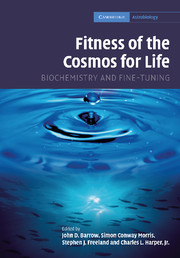Book contents
- Frontmatter
- Contents
- List of contributors
- Foreword: The improbability of life
- Preface
- Acknowledgments
- Part I The fitness of “fitness”: Henderson in context
- Part II The fitness of the cosmic environment
- Part III The fitness of the terrestrial environment
- 10 How biofriendly is the universe?
- 11 Tuning into the frequencies of life: a roar of static or a precise signal?
- 12 Life on earth: the role of proteins
- 13 Protein-based life as an emergent property of matter: the nature and biological fitness of the protein folds
- 14 Could an intelligent alien predict earth's biochemistry?
- 15 Would Venus evolve on Mars? Bioenergetic constraints, allometric trends, and the evolution of life-history invariants
- Part IV The fitness of the chemical environment
- Index
- References
14 - Could an intelligent alien predict earth's biochemistry?
Published online by Cambridge University Press: 18 December 2009
- Frontmatter
- Contents
- List of contributors
- Foreword: The improbability of life
- Preface
- Acknowledgments
- Part I The fitness of “fitness”: Henderson in context
- Part II The fitness of the cosmic environment
- Part III The fitness of the terrestrial environment
- 10 How biofriendly is the universe?
- 11 Tuning into the frequencies of life: a roar of static or a precise signal?
- 12 Life on earth: the role of proteins
- 13 Protein-based life as an emergent property of matter: the nature and biological fitness of the protein folds
- 14 Could an intelligent alien predict earth's biochemistry?
- 15 Would Venus evolve on Mars? Bioenergetic constraints, allometric trends, and the evolution of life-history invariants
- Part IV The fitness of the chemical environment
- Index
- References
Summary
This is a book about whether our universe is “biocentric.” The Oxford English Dictionary defines this term as “treating life as a central fact” [1]; thus a biocentric universe is one predisposed towards producing life (life's centrality is implicit if “the fitness of the environment [for life] far precedes the existence of the living organisms” [2]). To date, this unusual idea has been most thoroughly explored (and most widely publicized) under the umbrella term “Anthropic Principle” in physics [3]. In essence, this principle refers to a suite of fundamental physical parameters, dimensionless constants that interact to imbue our universe with such interrelated phenomena as a diverse periodic table of elements, a preponderance of carbon and water, stars that emit energy, and planets that orbit them [4]. It asserts that, without clear explanation at present, the constants responsible for this state of affairs appear finely tuned in our universe to values peculiarly sympathetic with life's emergence.
Even if we accept this view of physics at face value, we remain a long logical leap from establishing truly biocentric credentials for our universe. Understanding “what is” versus “what might have been” for physics must be met by an equivalent understanding in biology. Thus the interface of biochemistry, where physics becomes biology, deserves especially close scrutiny. In this context, the first and perhaps most important point of this chapter is to emphasize that in considering physics and biology, two fundamentally different sets of expectations collide.
- Type
- Chapter
- Information
- Fitness of the Cosmos for LifeBiochemistry and Fine-Tuning, pp. 280 - 317Publisher: Cambridge University PressPrint publication year: 2007
References
- 1
- Cited by

